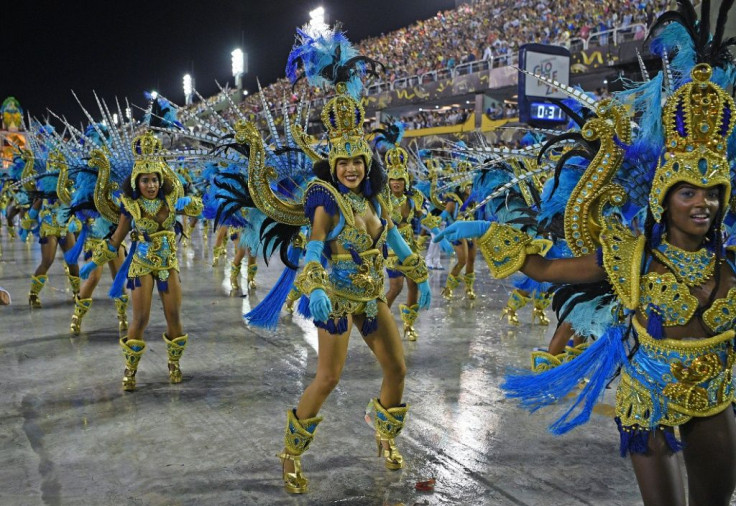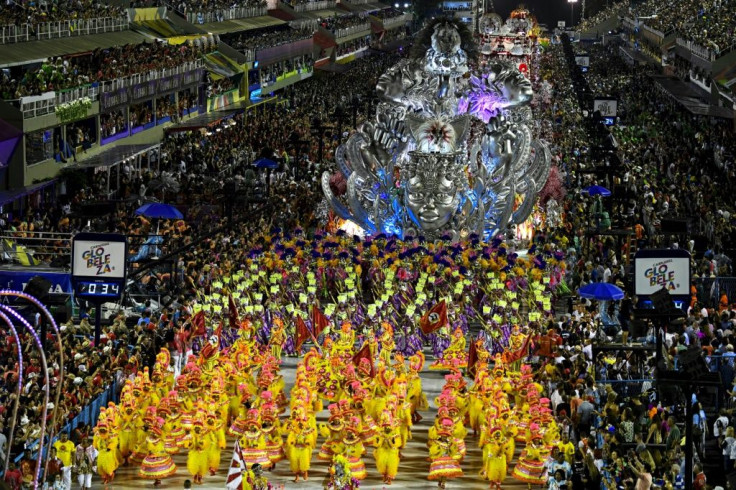Rio Postpones World-famous Carnival Over Covid-19
Rio de Janeiro's world-famous carnival parades became the latest casualty of the coronavirus pandemic Thursday as officials announced they were indefinitely postponing the February 2021 edition, with Brazil still reeling from Covid-19.
Rio's carnival, the world's biggest, is an epidemiologist's nightmare in a pandemic: an extended festival of tightly packed crowds dancing through the streets and flocking to the city's iconic "Sambadrome" for massive parades featuring scantily clad dancers, small armies of drummers and all-night partying at close quarters.
The event draws millions of tourists from around Brazil and the world to the beachside city each year.
Rio's elite samba schools, which typically spend the entire year preparing their elaborate parades, had said in July it would be difficult to organize the event for February 2021 if there were still no certainty of a vaccine for the new coronavirus by late September.
Meeting again to assess the situation, "we came to the conclusion that the event had to be postponed," said Jorge Castanheira, the president of the group that organizes the annual parades, the Independent League of Samba Schools of Rio de Janeiro (LIESA).
"We just can't do it in February. The samba schools won't have the time or financial and organizational resources to be ready," he told journalists after a plenary meeting by the group's directors.

"It's not a cancellation, it's a postponement. We are looking for an alternative solution, something we can do when it's safe to contribute to the city.... But we aren't certain enough to set a date."
It is the first time in more than a century that carnival has been postponed in Rio.
The last time was in 1912, after the death of long-time foreign minister Jose Maria da Silva Paranhos Junior.
The late foreign minister is reported to have once said: "Only two things exist in Brazil which are really organized: disorder and carnival."

The year he died, carnival was officially pushed back by two months, though in the event Rio residents reportedly took advantage of the occasion to party in both February and April that year.
In reality, "carnival" comprises numerous events, from the elite samba school parade contest organized by LIESA to less-formal "blocos," or street parties.
LIESA's announcement applies only to the samba school competition. City authorities have not yet announced whether "blocos" and other events will be allowed.
Speculation had been mounting that authorities would have to cancel or postpone carnival in 2021, given that Brazil is the country with the second-highest death toll in the pandemic, after the United States, and is still struggling to bring the virus under control.
Brazil has registered 4.7 million infections and nearly 140,000 deaths from Covid-19.
And while the spread of the virus has slowed somewhat since its July peak, the numbers are still alarmingly high in Brazil, with an average of nearly 30,000 new cases and 735 new deaths per day over the past two weeks, according to health ministry figures.
Brazil has struggled to set a cohesive policy to deal with the pandemic.
Far-right President Jair Bolsonaro has railed against lockdown measures as a catastrophe for the economy, and downplayed the disease as a "little flu," despite being forced into quarantine for nearly three weeks when he caught it himself in July.
Rio de Janeiro has been the state hit second-hardest in Brazil, after Sao Paulo, the country's industrial hub.
With 18,000 people killed so far, if Rio state were a country, it would have the world's second-highest mortality rate from Covid-19, at 104 deaths per 100,000 inhabitants.
Rio had already announced in July it was cancelling its famous New Year's Eve celebrations on Copacabana beach this year.
Tourism officials say they are seeking alternative celebrations that would be compatible with social distancing guidelines.
© Copyright AFP 2024. All rights reserved.





















